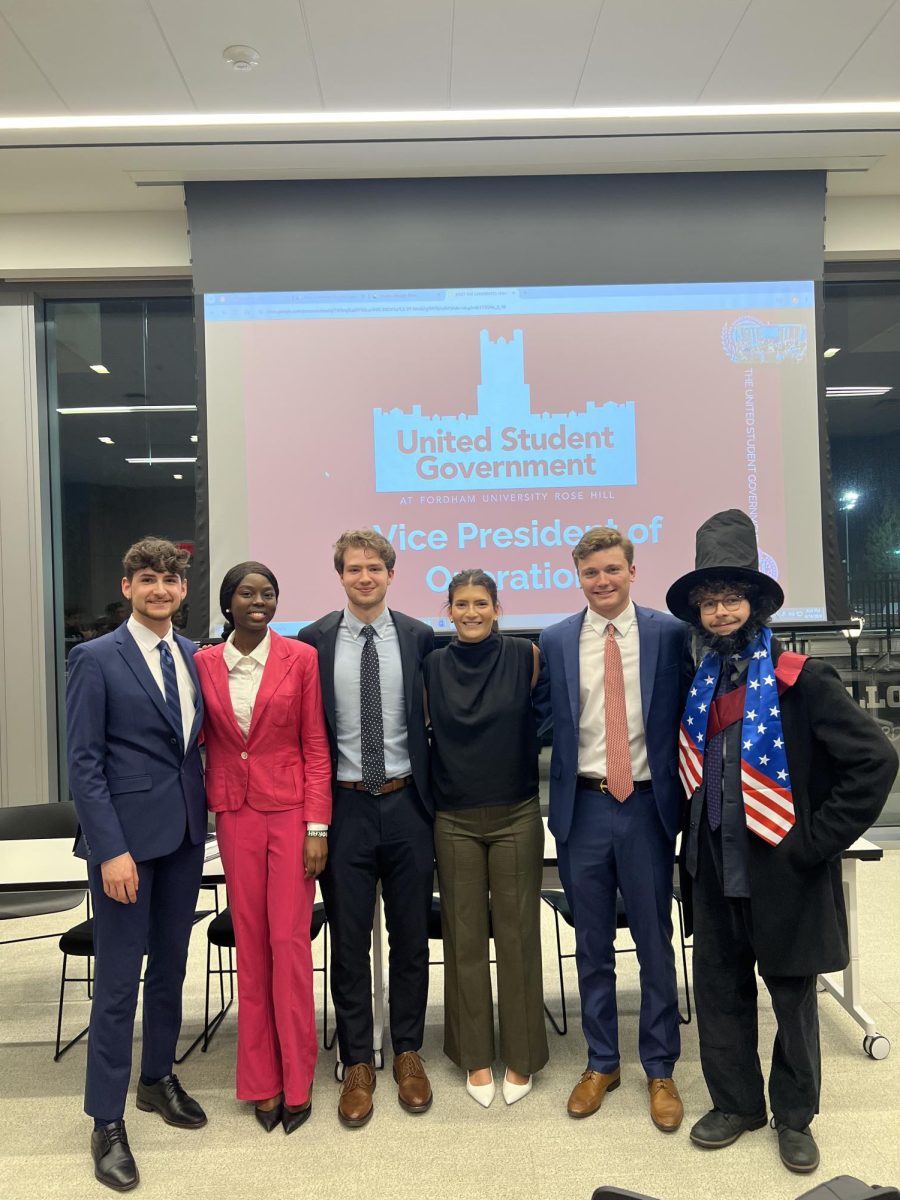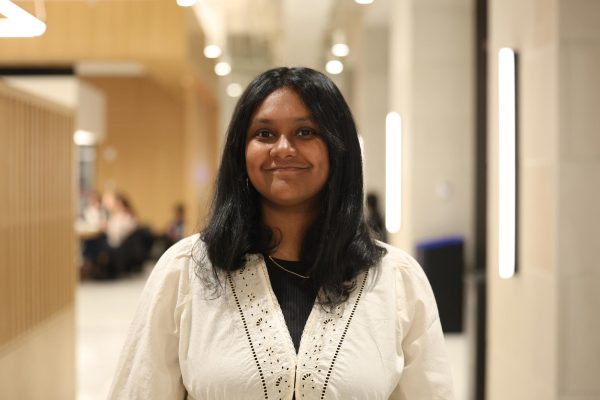On Thursday, April 18, Fordham University Rose Hill United Student Government (USG) hosted “Meet the Candidates” for the executive tickets in the election for the 2024-25 academic year. Candidates running for executive president and vice president included Lucas Hjertberg, FCRH ’26, and Eron Maltzman, FCRH ’25; Deborah Adebanjo, FCRH ’26, and Nicola D’Abundo, FCRH ’26; Ava Coogan, FCRH ’25, and Zachary Visconti, FCRH ’25; and Andrew McDonald, FCRH ’26, and Samuel Daniels, FCRH ’26. Current Executive President Briana Al-Omoush, FCRH ’24, and Vice President for Fordham College at Rose Hill Emma Balint, FCRH ’24, were the co-commissioners of the election, with The Fordham Ram’s Editor-in-Chief Sofia Donohue, FCRH ’25, moderating the debate.
Hjertberg and Maltzman were the first to give their speeches, calling themselves the most experienced candidates. Hjertberg currently serves as vice president of budgets and finance; Maltzman previously held the same position. Key elements of their proposal included increased financial aid for returning students, ending professor deportations (which hit a record of three last semester) and adding Fordham ID cards to Apple Wallet.
“Positive and possible change is the only way to get us through this rough patch,” said Hjertberg. He also cited his previous win with the USG referendum, a two-year-long process, and his history of union support.
“Anyone can provide a platform with what they hope to achieve, but not everyone has the skills and experience to back that up,” said Maltzman, who joined the event virtually from London. He also seconded the campaign’s proposal for a fixed tuition rate.
“A fixed tuition rate is pretty standard in a lot of other universities,” Maltzman noted. Hjertberg and Maltzman argued that Fordham students should have their tuition and scholarships set so that their aid is not diluted.
Adebanjo and D’Abundo, current senators for the class of 2026, presented their campaign next. D’Abundo cited his previous wins such as pushing for Collins Auditorium to include physical braille in place of the previous paper sheets which ultimately led to the renovation of the whole auditorium. Adebanjo addressed the student activities fee referendum, saying it posed an additional financial burden to students.
“Nicola and I are not just candidates. We are students like you, fighting for change,” said Adebanjo.
Donohue asked the executive ticket as to why their ticket’s Instagram page (@deborahandnicola4usg) followed the Instagram page @f.s.a.i.c (Fordham Students Against Impractical Candidates), Adebanjo pushed back against the question and declined to comment.
“I don’t think that’s a serious question for us,” said Adebanjo. “Why are you asking us about an Instagram page?”
In response to Donohue’s question about supporting LBGTQ+ students, D’Abundo stated plans to enforce the chosen name policy and to make the residence halls safer by working with the Residence Halls Association.
Coogan, the current executive vice president, and Visconti, a GSB class of 2025 senator, went next. Coogan noted previous initiatives, such as Counseling and Psychological Services resources on syllabi, native plants on campus and accessibility information being made more available. The running mates are currently in the process of relaunching the “Fordham Friendly” program which will increase the number of Bronx businesses who offer discounts for Fordham students.
One of Coogan and Visconti’s proposed initiatives is a bi-semesterly town hall, led for and by students as well as semesterly administration panels where students can directly ask administration members questions.
McDonald and Daniels were last to present. Daniels drew attention to the issues of accessibility on campus, such as the Office of Disability Services not having a ramp, and increasing USG’s transparency. Dressed in a top hat and fake beard, McDonald delivered his speech modeled after the Gettysburg Address, which he titled the “Ramsesburg Address.”
“I am serious about getting the [live] Ram. I’m in contact with three farms in Westchester,” said McDonald.
After initial speeches, the Q&A panel moderated by Donohue began. Donohue asked how candidates planned to enact positive change outside of their proposals as they are often not always passed.
Hjertberg described proposals as a mere starting point for the work that has to be followed through afterward, noting the proposal to expand opportunities for Middle Eastern and Northern African students, which was finished in two days but needed three to four months to get the changes through. D’Abundo discussed his approach of seeing to the small things and letting the university take care of the larger ones. He cited an instance when he advocated for the addition of braille in Collins and the university ended up renovating the entire auditorium, according to D’Abundo.
Coogan noted the importance of outsourcing to the community and having conversations with higher ups on campus to achieve initiatives that may not necessarily need a proposal in order to be passed. Visconti also highlighted their ticket’s proposal to rework the proposal process. McDonald reiterated his campaign’s commitment to their goals.
When asked about transparency, Hjertberg noted that he and Maltzman have served as the executive directors of budgets and finance and have tried to increase financial transparency by increasing student participation in the referendum vote.
Adebanjo identified a need for clarification of USG’s structure and for making sure students knew that committees were parts of USG by conducting office hours and outreach to clubs for people of color. D’Abundo asked why proposals such as increased outreach were not carried out even though candidates had been on USG for two years.
Coogan asserted that USG is afraid of being vulnerable and anticipates a great deal of criticism if their ongoing initiatives don’t pass. She reiterated the need for USG to be open about their current affairs.
McDonald noted the need for USG to publicize votes instead of dismissing student reporters and non-USG students from the room during votes.
When asked about what challenges they anticipate, Hjertberg emphasized the need for USG to put personal opinions aside and go to the student body for feedback. D’Abundo reiterated his enthusiasm for making changes and noted that surveys for feedback had recently been shut down.
Coogan noted that the responsibilities and work of USG needed to be made more transparent to students who often don’t know what USG does. McDonald noted challenges such as properly allocating funding and organizing and overseeing committees.
With the panel concluded, audience questions began. The first question was about the repeated questions regarding the referendum, with one student citing the tuition increase as an issue needing greater attention.
“It’s the clarity that we need,” said D’Abundo. “Where is the money that we already had going?” His running mate Adebanjo stressed that the financial stress posed to students by the $95 increase to the student activities fee could not be ignored.
Hjertberg responded by asserting that USG had considered the question of raising the referendum with careful consideration from all senators. He reiterated that USG was open to student opinions and that prior to the referendum, all clubs saw their funding being cut.
The next student question was about resolving internal tensions within USG. McDonald alleged that tension occurs when USG asks non-senators to leave during their voting procedures.
When asked how candidates proposed to increase transparency, Hjertberg noted that while Fordham’s chief financial officer comes to the final Student Life Council meeting of every semester to go over Fordham’s budget in more detail, he would like to make this information more publicized.
Senator Ananya Grover, GSB ’26, directly asked D’Abundo, as co-head of the Diversity Action Coalition, if there were any other accessibility issues that have been passed as a result of his work; he noted that he was currently working on a portal for admitted and prospective students to see whether their accommodations would be met.
There are several candidates running unopposed for executive board tickets. Megan Ruzika, FCRH ’27, is running for vice president of operations. Joseph DaProcida, FCRH ’25, is running for vice president of student experience. Reese McDonnell, GSB ’26, is running for vice president of budget and finance. Emma Blake, FCRH ’25, is running for vice president of FCRH. Catie Flores, GSB ’25, is running for vice president of GSB. Aidan Costella, FCRH ’27, is running for vice president of health and security. Nyla Patel, FCRH ’25, is running for vice president of diversity and inclusion. Isaac Muir, FCRH ’26, is running for vice president of sustainability. Chris Konefal, GSB ’25, is running for vice president of facilities and dining.
A livestream recording of USG’s “Meet the Candidates” is available on their Instagram page (@fordhamusg). Voting will take place from April 22-23 and students can vote using the Rams Involved link sent via email. Voting will open at 1 p.m. on April 22 and will close at 5 p.m. on April 23.









































































































































































































